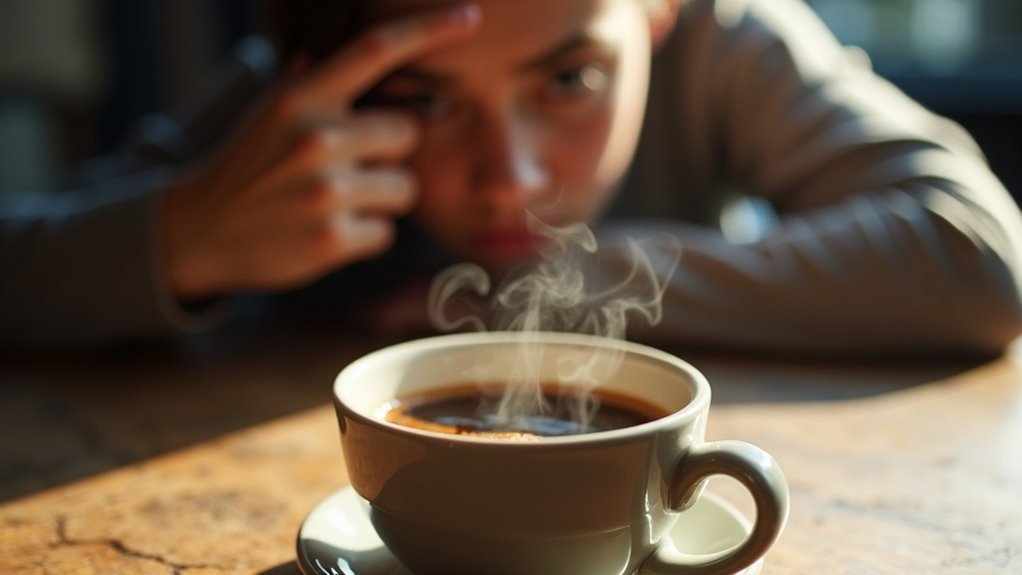Coffee can definitely lead to eye twitching. The caffeine in coffee overstimulates your nervous system, which can result in involuntary eyelid contractions, particularly if you consume more than 400mg daily. Additionally, factors such as stress, insufficient sleep, and extended screen time can exacerbate the issue. If the twitching continues for more than two weeks or if you notice other symptoms, it’s advisable to reach out to a healthcare professional. There are effective strategies to alleviate these symptoms, and exploring them can provide you with relief while enjoying your coffee.
Key Takeaways
- Coffee can lead to eye twitching due to caffeine overstimulating the nervous system and increasing muscle contractions in the eyelids.
- Excessive caffeine intake, particularly from coffee, over 400mg daily, is a common trigger for eye twitching symptoms.
- Individual sensitivity to caffeine varies, meaning some coffee drinkers may experience twitching with lower amounts.
- Reducing coffee consumption, ensuring adequate sleep, and managing stress can help alleviate eye twitching symptoms.
- If eye twitching persists beyond two weeks or is accompanied by other symptoms, it’s advisable to consult an eye care professional.
Understanding Eye Twitching
Understanding eye twitching is essential, especially if you’ve ever experienced it yourself. Eye twitching, or eyelid twitching, involves involuntary contractions of your eyelid muscles and is often harmless.
Common causes include excessive caffeine consumption, which can lead to increased muscle tension, fatigue, stress, and prolonged screen time, all of which can affect your eye health.
Excessive caffeine, fatigue, stress, and prolonged screen time can all contribute to eye twitching and impact your eye health.
While many experience these twitches sporadically, they’re more frequent in middle-aged and elderly women due to hormonal shifts and heightened stress.
If your twitching persists beyond two weeks or is accompanied by other symptoms, it’s wise to consult an eye care professional.
Preventative measures like reducing caffeine intake and using lubricating drops can help combat dry eyes.
How Caffeine Affects Eye Muscles
When you enjoy your coffee, it’s essential to be aware of how caffeine can affect your body, particularly your eye muscles. Caffeine can overstimulate your nervous system, leading to increased muscle contractions in your eyelids.
This overstimulation often results in eye twitching or eyelid twitches, especially if you indulge in excessive caffeine—over 400mg daily, which is roughly equivalent to four cups of coffee.
The good news? These muscle contractions are usually temporary and can resolve once you reduce your coffee intake. However, individual sensitivity varies; some may experience twitching with lower amounts of caffeine.
Additionally, lifestyle factors like stress and fatigue can exacerbate eye strain, making muscle twitching more likely. By understanding these connections, you can enjoy your favorite coffee while managing your caffeine consumption and minimizing any uncomfortable symptoms.
Other Contributing Factors to Eye Twitching
While caffeine from coffee is a well-known trigger for eye twitching, several other factors can contribute to this frustrating phenomenon. A lack of sleep often leads to tired muscles, making eyelid spasms more likely.
High-stress levels can exacerbate muscle contractions, further increasing twitching episodes. Additionally, prolonged screen time, which many coffee drinkers experience while working or enjoying their favorite brew, can cause eye strain as your eye muscles fatigue from constant focus.
Environmental factors, like bright lights or dry conditions, also play a role in irritating your eyes. By recognizing these influences on eye health, you can better understand the connection between your coffee consumption and eye twitching.
Reducing Eye Twitching Symptoms
If you’re struggling with eye twitching, incorporating some practical strategies can make a significant difference. Reducing caffeine intake, particularly from coffee, can help calm your nervous system, while ensuring you get 7 to 9 hours of sleep allows your eye muscles to relax. Stress management techniques, like meditation and exercise, can lower eyelid spasms triggered by stress. Following the 20-20-20 rule helps minimize eye strain. Additionally, using lubricating eye drops can soothe dry eyes, reducing twitching frequency.
| Strategy | Benefit |
|---|---|
| Reduce caffeine intake (coffee) | Calms nervous system |
| Guarantee adequate sleep | Relaxes eye muscles |
| Practice stress management | Lowers eyelid spasms |
When to Seek Medical Advice
Coffee can be a delightful daily ritual, but knowing when to seek medical advice regarding your coffee consumption is essential for your overall health.
If you find that your caffeine intake leads to symptoms like persistent jitters or anxiety lasting longer than two weeks, it may be time to reassess your coffee habits. You should consult a healthcare professional if you experience heart palpitations or if your caffeine consumption disrupts your sleep patterns significantly.
Additionally, if you notice digestive issues or increased blood pressure associated with your coffee intake, don’t hesitate to seek medical attention. Persistent headaches or migraines following coffee consumption warrant an immediate discussion with your doctor.








